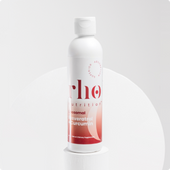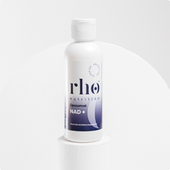Introduction
You've probably heard of vitamin C, the nutrient that many people take to fight illness and the common cold. But have you ever heard of liposomal vitamin C? It's a specialized form of vitamin C that is encapsulated in tiny phospholipid bubbles known as liposomes. Liposomal vitamin C has been shown to be more bioavailable (better absorbed by the body) than regular old-fashioned straight up ascorbic acid (the type found naturally in food). There are several reasons why this might be true:
Vitamin C is a water-soluble vitamin, which means our bodies don't store it
Vitamin C is a water-soluble vitamin, which means our bodies don't store it. We need to ingest it as part of our diet in order to ensure we get enough of this vital nutrient on a daily basis.
Vitamin C helps maintain healthy skin and connective tissues, supports the immune system, reduces inflammation and promotes healing.
Liposomes are microscopic fat or phospholipid bubbles that aren't absorbed into the body until they reach the cells
Liposomes are microscopic fat or phospholipid bubbles that aren't absorbed into the body until they reach the cells. They contain active ingredients, and protect them from being destroyed before they reach your bloodstream. Liposomal vitamin C is made by encapsulating the vitamin in liposomes, which allows it to be absorbed directly into your cells for a faster, more potent effect on your health.
Liposomal vitamin C is encapsulated in liposomes that are made from phosphatidylcholine (a healthy fatty acid), which protects the vitamin C from being destroyed before it gets to the bloodstream
The liposomes are made from phosphatidylcholine, which is a healthy fatty acid. They protect the vitamin C from being destroyed before it gets to your bloodstream.
Liposomal vitamin C gets absorbed into your body much faster than regular vitamin C. It’s also more stable in your body and is less likely to cause diarrhea or other gastrointestinal side effects than regular vitamin C because of this protection provided by the phosphatidylcholine.
Studies show that regular vitamin C can cause some side effects including nausea, vomiting, heartburn and abdominal pain
Vitamin C is a water-soluble vitamin that's needed for the growth and repair of all tissues in your body. The recommended daily intake of vitamin C is 90 milligrams (mg) per day. Vitamin C is beneficial in helping to maintain healthy blood vessels, skin, nails and bones. It also supports the immune system by boosting white blood cell production.
Vitamin C is well known for its antioxidant properties that protect against free radicals – unstable molecules that damage cells and cause disease. Since it’s water soluble, excess amounts of vitamin C can be easily excreted in urine so taking too much could result in an upset stomach or diarrhea as your body tries to get rid of them through urination.
Other side effects associated with regular vitamin C include nausea, vomiting, heartburn and abdominal pain due to high doses exceeding what your stomach can tolerate at one time resulting from too much being taken at once or over time because you didn't allow enough time between doses for absorption into the bloodstream before taking more; however this isn't true when taken as liposomal form which bypasses these issues altogether since it's absorbed more slowly into our bodies via our cells' membranes instead of going directly into circulation where we would then have difficulty absorbing them because they're not getting past those first few layers around our organs where most drugs need access via capillaries before reaching other areas."
Regular vitamin C is rapidly excreted from the body via urine, whereas liposomal vitamin C stays in your system for longer so that your body can benefit from it for a longer time
Regular vitamin C is rapidly excreted from the body via urine, whereas liposomal vitamin C stays in your system for longer so that your body can benefit from it for a longer time.
This means that when you take regular vitamin C, it gets broken down in your liver and then excreted through urine. However, when you take liposomal vitamin C, it is absorbed into the bloodstream and stays there for longer – this means that your body can benefit from it for a longer time (and still be able to pee out any excess).
Most supplements promise 500 milligrams of vitamin C, but studies have shown that an average of 18 percent is actually absorbed by the body
You're probably familiar with vitamin C, but you may not know how it works. Vitamin C is a water-soluble antioxidant that helps protect your cells from damage and neutralize free radicals in the body. It's also important for wound healing, immune system health, and collagen production.
Vitamin C deficiency has been linked to chronic fatigue syndrome, acne scarring and more serious illnesses like cancer and cardiovascular disease. In fact, some studies have shown that taking 1000 mg of supplemental vitamin C per day could reduce your risk of cancer by as much as 43 percent!
Most supplements promise 500 milligrams of vitamin C (also known as L-ascorbic acid), but studies have shown that an average of 18 percent is actually absorbed by the body when taken orally (by mouth). Liposomal vitamin C has an 80 percent absorption rate due to its ability to enter cells directly through cell membranes instead of staying in your stomach for a while like regular oral supplements do. Because this form is able to enter cells directly without having to go through digestion first (which involves enzymatic breakdown), it's easier for your body to absorb this form into its system quickly so it can do its job better than other types would be able to - without having side effects associated with taking too much."
Liposomal vitamin C can be taken on an empty stomach without causing discomfort or gastrointestinal distress, whereas taking plain old vitamin C tablets on an empty stomach may cause some people discomfort
Liposomal vitamin C is absorbed into the bloodstream more slowly than regular vitamin C, which means it doesn’t cause an acute spike in blood levels of ascorbic acid. This can be especially beneficial for people who have difficulty tolerating high doses of vitamin C, such as those with gastrointestinal upset or kidney stones.
Liposomal vitamin C is also more stable than regular supplement forms of the nutrient. This means that it won’t degrade easily under normal storage conditions, so you can expect your liposomal supplements to last longer than other types of vitamin C supplements.
Because liposomal supplements are better absorbed when taken orally (that is, they dissolve readily in water and pass through cell membranes), they're also more bioavailable than traditional intake methods like tablets or capsules.














Leave a comment